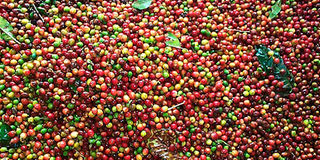Global coffee consumption up

Coffee berries. The International Coffee Organisation expects coffee production to be around 127 million bags this year. Photo/FILE
Coffee prices appear to be rallying on the international markets after a marked fall earlier this year while production across much of sub-Saharan Africa is set to increase.
Even before this week’s International Coffee Organisation (ICO) meeting in London, evidence is growing that coffee consumption has not been as badly affected as had first been feared due to the global economic recession.
There is some evidence that people are drinking less coffee out in cafes and restaurants but consumption is predicted to rise to 129 million bags this year.
“This indicates that the world economic crisis has not affected general coffee consumption, although reports have been received of changes in patterns of consumption, particularly a shift to more in-home drinking,” says an ICO report.
Latest figures from the organisation indicate that coffee production in Kenya grew by 35 per cent to 883,000 bags last year, while Tanzania saw a 13 per cent growth rate to 917,000 bags.
In contrast, production in Uganda fell by nearly five per cent to 3,100,000 bags but remains around one million bags higher than in 2005.
The ICO is predicting increased production across much of sub-Saharan Africa this year although it expects the Arabica variety production in Brazil to be lower because of the biennial cycle that characterises production there.
Overall, the organisation expects total production to be around 127 million bags this year.
Kenya and Uganda are both on the executive board of the ICO at the meetings, which is holding discussions on market developments over the coming year.
It will also see a key session on how to provide short to medium term finance to small-scale coffee farmers in Kenya, a major issue for poor growers affected by volatile international markets.




